No Ads, No Pop-ups – Just Information and Opportunities!
Want to be a Wiccan?
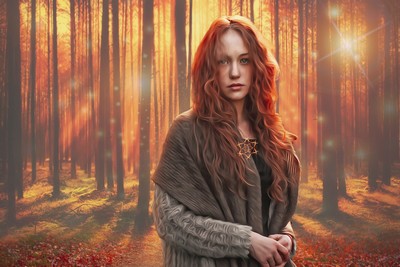
If you want to be a Wiccan, you need to be certain about what Wicca means and what being a Wiccan means too.
Wicca is a modern pagan religion that emerged in the mid-20th century and is based on pre-Christian European beliefs and practices. It is a nature-based religion that celebrates the cycles of the seasons and the phases of the moon, and it emphasizes the worship of the divine as embodied by the God and Goddess. Wiccans believe in the interconnectedness of all things and strive to live in harmony with nature and the universe. Wicca emphasizes personal responsibility, ethical behavior, and the pursuit of spiritual growth and enlightenment. Wiccans may practice individually or in groups, known as covens, and they may follow a specific tradition or create their own unique spiritual path. The practice of Wicca includes the use of rituals, spells, divination, and other forms of magic to bring about positive change in one's life and in the world.
A Wiccan is a person who practices Wicca. Wiccans may identify as witches, pagans, or followers of the old religion. They believe in the divine as a dualistic force embodied by a God and Goddess, and they celebrate the cycles of the seasons and the phases of the moon through ritual and ceremony. Wiccans also believe in the use of magic and other forms of spiritual practice to bring about positive change in their lives and the world around them. They may practice alone or in groups, and they may follow a specific tradition or create their own unique spiritual path within the larger framework of Wicca.
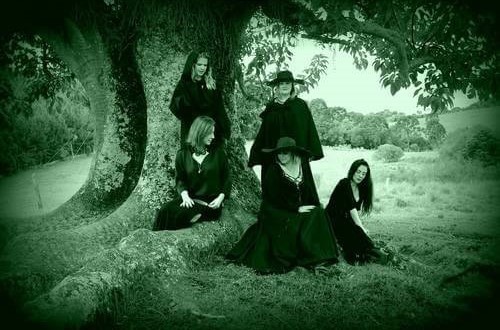
Wiccan Beliefs and Values
Wicca is a nature-based religion that emphasizes personal responsibility, ethical behavior, and the pursuit of spiritual growth and enlightenment. If you want to be a Wiccan, here are some of the core beliefs and values you need:
The Divine
Wiccans believe in the existence of a divine force that is present in all living things and the natural world. This force is often represented by a God and Goddess who embody masculine and feminine energies and are worshipped and celebrated in Wiccan rituals.
The Elements
Wiccans believe that the universe is composed of four elements - earth, air, fire, and water - and that each element has its own unique energy and symbolism.
The Wheel of the Year
Wiccans celebrate the cycles of the seasons and the changing phases of the moon through a series of eight festivals known as the Sabbats. These festivals are based on ancient agricultural and mythological traditions and are an opportunity for Wiccans to connect with nature and the divine.
Magic
Wiccans believe in the use of magic and other forms of spiritual practice to bring about positive change in their lives and the world around them. This includes the use of spells, rituals, divination, and other forms of magic.
Ethics
Wiccans are guided by a code of ethics that emphasizes personal responsibility, respect for others, and harmlessness. This code is often summarized by the Wiccan Rede, which states, "An it harm none, do what ye will."
Nature
Wiccans place a high value on the natural world and the interconnectedness of all living things. They strive to live in harmony with nature and to protect the environment.
Personal Growth
Wiccans believe in the importance of personal growth and spiritual development. They see their religious practices as a means of achieving greater understanding, self-awareness, and enlightenment.
Overall, Wiccan beliefs and values are centered around the worship of the divine in nature, the celebration of the cycles of the seasons and the moon, the use of magic and spiritual practice for positive change, and a commitment to personal responsibility, ethics, and personal growth.
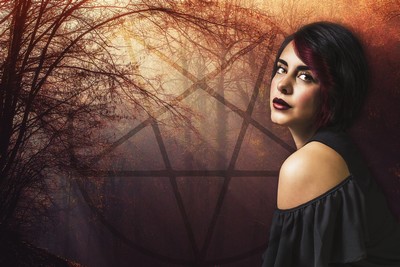
Finding your Path: Different Types of Wicca
If you want to be a Wiccan, you must appreciate that Wicca is a diverse and inclusive religion that encompasses a wide range of beliefs and practices. One of the most exciting things about Wicca is the variety of paths and traditions that you can explore, each with its own unique practices, rituals, and beliefs. Whether you are new to Wicca or have been practicing for years, finding the right path for you can be a deeply rewarding experience.
One of the most popular and well-known traditions within Wicca is Gardnerian Wicca, which was founded by Gerald Gardner in the mid-20th century. Gardnerian Wicca emphasizes the worship of the God and Goddess, the practice of magic, and the use of initiatory rituals to mark spiritual growth and progress.
Another popular tradition within Wicca is Alexandrian Wicca, which was founded by Alex Sanders in the 1960s. Alexandrian Wicca shares many similarities with Gardnerian Wicca, but also incorporates elements of ceremonial magic and emphasizes the role of the High Priestess in leading the coven.
If you are interested in a more eclectic and individualized approach to Wicca, you might consider exploring the path of Solitary Wicca. This path emphasizes personal responsibility, self-discovery, and the use of magic and ritual to connect with the divine.
Other popular traditions within Wicca include Dianic Wicca, which emphasizes the worship of the Goddess, and Celtic Wicca, which draws on the traditions and mythology of ancient Celtic cultures.
No matter which path you choose, the most important thing is to find a tradition and community that resonates with you and supports your spiritual growth and development. With so many paths and traditions to explore, the possibilities for finding your own unique path within Wicca are endless.
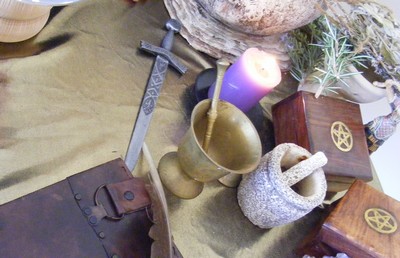
Want to be a Wiccan? Here's Your Essential Wiccan Supplies
Wicca is a spiritual practice that involves the use of various tools and supplies to help practitioners connect with the divine, focus their energy, and enhance their magical work. While many of these tools are not strictly necessary for practicing Wicca, they can help create a sacred space and provide a physical representation of the spiritual principles and energies at work.
One of the most essential tools in Wicca is the athame, a ritual knife that is often used to direct energy and cast circles. Other important tools include the chalice, which represents the element of water and is used for ritual libations; the wand, which represents the element of air and is used to direct energy; and the pentacle, a flat disc inscribed with a pentagram that represents the element of earth and is used as a surface for charging objects and performing rituals.
Candles are also an important tool in Wicca, as they represent the element of fire and can be used to enhance ritual work and meditation. Other supplies that are commonly used in Wicca include herbs, crystals, oils, and incense, which can be used for their spiritual and magical properties.
While it's not necessary to have every tool and supply associated with Wicca, having a few key items can help create a sacred space and enhance your spiritual practice. Whether you are just starting out or have been practicing Wicca for years, incorporating these essential tools and supplies can help deepen your connection to the divine and enhance your magical work.
Wiccan Rituals and Celebrations: Honoring the Wheel of the Year
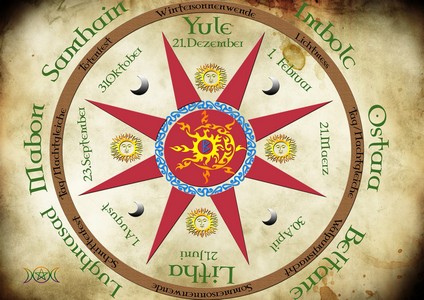
If you want to be a Wiccan, then Wiccan rituals and celebrations are an essential part of the practice, allowing Wiccans to connect with the divine and honor the cycles of nature. The Wheel of the Year is the annual cycle of seasons and celebrations that mark the changing of the seasons and the movement of the sun and moon.
The Wheel of the Year is comprised of eight Sabbats, or seasonal celebrations, which are evenly spaced throughout the year. These Sabbats are a way to honor the natural world and celebrate the changing seasons. They offer an opportunity to reflect on the natural cycles of birth, growth, death, and rebirth, and to connect with the divine in a deeper way.
The Sabbats are typically marked by rituals and ceremonies that incorporate symbolism and elements of nature. For example, the celebration of Imbolc, which takes place in early February, is a time to honor the coming of spring and the awakening of the earth after winter. Rituals might include lighting candles or planting seeds to symbolize new beginnings and growth.
At the summer solstice, known as Litha, Wiccans celebrate the longest day of the year and the power of the sun. Rituals might include bonfires, dancing, and the making of flower crowns.
The autumnal equinox, known as Mabon, is a time to celebrate the harvest and give thanks for the abundance of the earth. Rituals might include the making of cider, decorating the home with fall leaves and vegetables, and offering gratitude to the land and the spirits.
Wiccan rituals and celebrations offer a rich and meaningful way to connect with the divine and honor the natural cycles of the world, and are essential elements if you want to be a Wiccan. By participating in these rituals, Wiccans can deepen their spiritual practice and develop a greater understanding of their place in the universe.
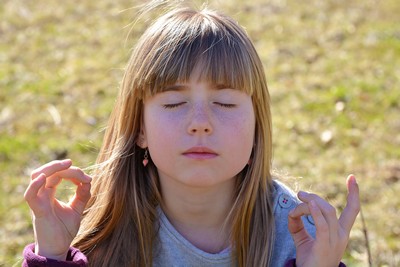
Incorporating Wiccan Practices into Daily Life
Wicca is not just a religion or spiritual practice, and if you want to be a Wiccan you need to appreciate that it is a way of life. Incorporating Wiccan practices into daily life can help to bring a sense of purpose, meaning, and spirituality to the everyday. Here are some ways to incorporate Wiccan practices into daily life:
Mindfulness
Practicing mindfulness is an important aspect of Wiccan
spirituality. Mindfulness involves being present in the moment and fully
engaged with your surroundings. Taking a few minutes each day to practice
mindfulness can help to reduce stress, increase focus, and cultivate a deeper
sense of inner peace.
Gratitude
Wiccans believe in the importance of gratitude and giving
thanks for the blessings in our lives. Taking time each day to reflect on the
things you are grateful for can help to shift your focus away from negativity
and towards positivity and abundance.
Nature Connection
Wiccans place a high value on the natural world and the
interconnectedness of all living things. Spending time in nature, whether it's
going for a walk in the woods or tending to a garden, can help to cultivate a
deeper connection to the earth and the divine.
Rituals and Ceremonies
Incorporating small rituals and ceremonies into daily
life can help to bring a sense of sacredness to the everyday. Lighting a candle
or saying a blessing before a meal can help to create a sense of mindfulness
and appreciation for the moment.
Magic
Wiccans believe in the use of magic and spiritual
practice to bring about positive change in their lives and the world around
them. Whether it's performing a simple spell or practicing divination,
incorporating magic into daily life can help to bring a sense of empowerment
and possibility to everyday challenges.
Incorporating Wiccan practices into daily life can help to bring a sense of spirituality,
purpose, and positivity to the everyday. By incorporating mindfulness,
gratitude, nature connection, rituals and ceremonies, and magic into daily
life, Wiccans can cultivate a deeper understanding of their place in the
universe and a greater sense of inner peace and empowerment. These are essentials if you want to be a Wiccan
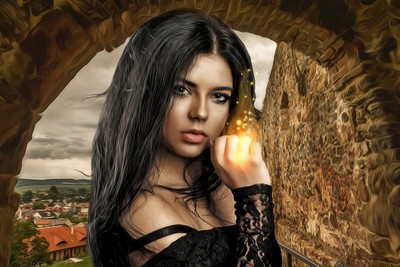
Common Questions About Wicca
Wicca is a diverse and often misunderstood religion that has been shrouded in mystery and misinformation for many years. If you are new to Wicca, or just curious about this spiritual path, you may have some questions about what it is and what it entails. Here are some common questions about Wicca, answered:
What is Wicca?
Wicca is a modern, nature-based religion that emphasizes personal responsibility, ethical behavior, and the pursuit of spiritual growth and enlightenment.
Do Wiccans worship the devil?
No, Wiccans do not worship the devil or believe in the Christian concept of Satan. Wiccans believe in a divine force that is present in all living things and the natural world.
Do Wiccans cast spells?
Yes, Wiccans often use magic and other forms of spiritual practice to bring about positive change in their lives and the world around them. This includes the use of spells, rituals, divination, and other forms of magic.
What are the Wiccan Rede and the Threefold Law?
The Wiccan Rede is a code of ethics that emphasizes personal responsibility, respect for others, and harmlessness. The Threefold Law is the belief that whatever energy or intent a person puts out into the universe will be returned to them threefold.
Do Wiccans believe in reincarnation?
Many Wiccans believe in the concept of reincarnation, or the idea that the soul continues to live on after death in a new body or form.
By understanding the basics of Wicca and dispelling common myths and misconceptions, we can gain a greater appreciation for this rich and diverse spiritual path. If you have any more questions about Wicca, don't hesitate to do more research or reach out to Wiccan communities for more information.
To live a fulfilling and prosperous life and cultivate good karma, it is
crucial to maintain a positive energy. One effective approach to
achieving this is by engaging in voluntary charity work.
The Full Moon is Coming Soon...
April 2025
Here's your chance to Order your own Powerful Full Moon Spell
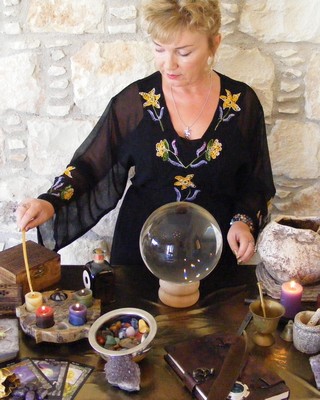
A Full Moon Spell That Works
Have real Witch Alizon cast your Powerful Full Moon Spell on the upcoming full moon. A Full Moon Spell to manifest whatever you most desire!
Cast on the next Full Moon by Alizon, an experienced White Witch and Spell Caster.
Don't miss out on the
coming Full Moon April 2025
Your chance to change your destiny
You may want a Full Moon Spell to:
- Allow money to flow to you
- Enhance your sexual attraction
- Allow a business or career to prosper and grow
- Gain committed love & total faithfulness from a lover
- Reunite with an ex lover
- Become prosperous and successful
- Change your bad luck to good
- Or any positive purpose you may have
REVIEWS
SPELLS
111 Ritual
222 Ritual
Attraction Spells
Love Spells
Money Spells
All Spells
Full Moon Spells
New Moon Spells
Sex Spells
Reunite Spells
Weight Loss Spells
Protection Spells
Commitment Spell
Complex Love
Soul Mate Spells
Success Spells
Fame & Fortune
Custom Spells
Ultimate Spell
The Ultimate Sacred Balance Spell
Connect with Me
The law requires me to state that the contents of this website are for entertainment purposes only.
Psychic, tarot and spell casting services cannot be a substitute for professional, legal, medical, financial or psychiatric advice/care, where appropriate.
You must be at least 18 years old to make any purchase from me.
© Copyright All Original Content 2006 – 2025 Alizons-psychic-secrets.com. All Rights Reserved.
Reproduction in whole or in part without permission is not permitted.



